|
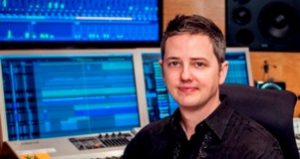
In Spanish
«In Far Cry: Primal, aside from Malukah and the Ram’s horn it’s all me performing the score live»
Jason Graves tlaks in this interview about his work in the video game Far Cry: Primal, a score with primitive sonorities in which he has been responsible for almost all the instruments we hear in the score.
Hello Jason, thank you for this interview. Tell us how you came to join the Far Cry: Primal development team. Which of your earlier works do you think was the reason to contact you for this project?
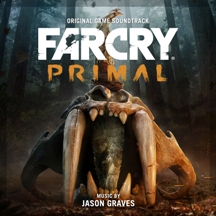 That’s a great question and I specifically asked Ubisoft that when they invited me on board but the answer wasn’t what I expected. Given the prehistoric time period that Primal in set in, I assumed they had heard my score for Tomb Raider and based their decision on its percussive, driving music. It turns out that Simon Landry from Ubisoft had actually come across my score for Evolve while surfing YouTube for potential composers. He told me Ubisoft really responded to the textural, rhythmic soundscapes. That’s a great question and I specifically asked Ubisoft that when they invited me on board but the answer wasn’t what I expected. Given the prehistoric time period that Primal in set in, I assumed they had heard my score for Tomb Raider and based their decision on its percussive, driving music. It turns out that Simon Landry from Ubisoft had actually come across my score for Evolve while surfing YouTube for potential composers. He told me Ubisoft really responded to the textural, rhythmic soundscapes.
As you have done in previous projects, did you carry out any experimentation in sound and instrumentation that you subsequently applied to your work for Far Cry: Primal? How did you manage to capture the sound of our ancestors?
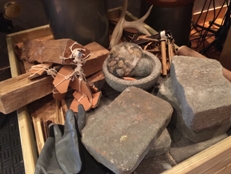 Of course there were sound experiments aplenty, especially considering the unique time in which Primal takes place. In the beginning it was simply about honing a “sound” for the score. I knew I didn’t want to have any modern material involved, as far as instruments and sound sources were concerned no plastic, metal or any kind of current technology. I focused on skin, bone, wood, clay, stone and even dirt seemed like a simple but very challenging way to immediately set a unique musical tone for the game. Of course there were sound experiments aplenty, especially considering the unique time in which Primal takes place. In the beginning it was simply about honing a “sound” for the score. I knew I didn’t want to have any modern material involved, as far as instruments and sound sources were concerned no plastic, metal or any kind of current technology. I focused on skin, bone, wood, clay, stone and even dirt seemed like a simple but very challenging way to immediately set a unique musical tone for the game.
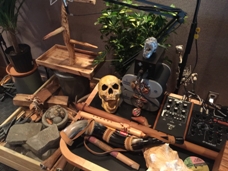 In fact, about a third of score doesn’t have any actual instruments in it at all. The music for the Udam tribe, one of the enemy tribes you fight against, was created entirely from found objects that could have existed back then. Large pieces of wood, stones, bamboo, clay pots, dirt, gravel and three different kinds of shrubbery were all put through their paces and eventually broken, worn out or simply died as a result of massive, enthusiastic banging and striking. I was also able to record the world’s foremost expert on “Breathing and Grunting in an Animalistic yet Rhythmically Musical Way.” In fact, about a third of score doesn’t have any actual instruments in it at all. The music for the Udam tribe, one of the enemy tribes you fight against, was created entirely from found objects that could have existed back then. Large pieces of wood, stones, bamboo, clay pots, dirt, gravel and three different kinds of shrubbery were all put through their paces and eventually broken, worn out or simply died as a result of massive, enthusiastic banging and striking. I was also able to record the world’s foremost expert on “Breathing and Grunting in an Animalistic yet Rhythmically Musical Way.”
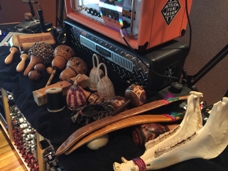 Other key elements were Malukah’s vocals for the Izila and the Ram’s horn that Alan Atkinson performed for the epic hunts. Vocal and wind elements were the main ways I distinguished the three tribes from each other. The peaceful flute and Ram’s horn for the player’s Wenja tribe, war calls and chanting from Malukah for the Izila and of course yours truly doing the inspirational grunting and heavy breathing for the Udam…fingers crossed for awards season! Other key elements were Malukah’s vocals for the Izila and the Ram’s horn that Alan Atkinson performed for the epic hunts. Vocal and wind elements were the main ways I distinguished the three tribes from each other. The peaceful flute and Ram’s horn for the player’s Wenja tribe, war calls and chanting from Malukah for the Izila and of course yours truly doing the inspirational grunting and heavy breathing for the Udam…fingers crossed for awards season!
In composing a score one can separate a writing process and another one to carry out the actual score. In the case of Far Cry: Primal do you think the process to carry out the score has required extra care or has been something more balanced?
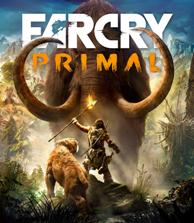 Writing and actual production were one and the same for Primal. I was literally composing the score as I performed it. Aside from Malukah and the Ram’s horn it’s all me performing the score live (yes, even the grunting vocals), stacking up to forty performances on top of each other. In fact, the production aspect really came about first, purely because I needed to have different recording stations around my studio in order to produce the most music possible as quickly as I could. The production informed the performance and vice versa. Writing and actual production were one and the same for Primal. I was literally composing the score as I performed it. Aside from Malukah and the Ram’s horn it’s all me performing the score live (yes, even the grunting vocals), stacking up to forty performances on top of each other. In fact, the production aspect really came about first, purely because I needed to have different recording stations around my studio in order to produce the most music possible as quickly as I could. The production informed the performance and vice versa.
Being a sandbox game, Far Cry: Primal could be one of the biggest projects in which you have participated. How does this affect your work?
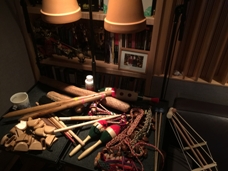 The work, or the way the music is put together and delivered, really differs from project to project based more on the musical needs than the technical requirements of the project. The only difference a sandbox game makes for me is the sheer amount of music that is required. The music was essentially broken down into two sections storydriven and open world. It was almost like composing for two different games that shared the same sound and instruments, including the amount of music that needed to be delivered. There was probably twice the usual amount of music needed and a very granular stemming system I came up with to give Ubisoft the most control over the implementation. The work, or the way the music is put together and delivered, really differs from project to project based more on the musical needs than the technical requirements of the project. The only difference a sandbox game makes for me is the sheer amount of music that is required. The music was essentially broken down into two sections storydriven and open world. It was almost like composing for two different games that shared the same sound and instruments, including the amount of music that needed to be delivered. There was probably twice the usual amount of music needed and a very granular stemming system I came up with to give Ubisoft the most control over the implementation.
Your career is full of big hits and even bigger compositions. What do you think Far Cry: Primal currently contributes to your career?
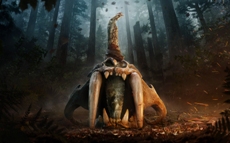 How very kind of you! It was a wonderful privilege to contribute music to such an iconic and respected franchise. I always record as many live performances as I can on my projects and Primal is definitely the biggest collection of live instruments I’ve produced. So for me personally, it was a huge technical milestone as well. But mostly I would have to say Primal was a creatively inspiring experience that led to making new friends and establishing new relationships with wonderful people who are as dedicated to their jobs as I am to mine, which is making the best possible game we can for the players. How very kind of you! It was a wonderful privilege to contribute music to such an iconic and respected franchise. I always record as many live performances as I can on my projects and Primal is definitely the biggest collection of live instruments I’ve produced. So for me personally, it was a huge technical milestone as well. But mostly I would have to say Primal was a creatively inspiring experience that led to making new friends and establishing new relationships with wonderful people who are as dedicated to their jobs as I am to mine, which is making the best possible game we can for the players.
|
Author

David Doncel
BIO:
Jason Graves is a composer who has brought his passion for music to projects such as Far Cry: Primal, Until Dawn, Tomb Raider and Dead Space. He is particularly enthusiastic about illustrating a project’s story and character arcs through the power of music. His sophisticated composition style has made his work synonymous with unique musical textures and cinematic orchestral writing.
As a classically-trained composer and world percussionist, Jason created an entirely live organic score for Far Cry: Primal, blending a diverse array of sounds from the natural environment and incorporating many animal effects into the score.
|



 That’s a great question and I specifically asked Ubisoft that when they invited me on board but the answer wasn’t what I expected. Given the prehistoric time period that Primal in set in, I assumed they had heard my score for Tomb Raider and based their decision on its percussive, driving music. It turns out that Simon Landry from Ubisoft had actually come across my score for Evolve while surfing YouTube for potential composers. He told me Ubisoft really responded to the textural, rhythmic soundscapes.
That’s a great question and I specifically asked Ubisoft that when they invited me on board but the answer wasn’t what I expected. Given the prehistoric time period that Primal in set in, I assumed they had heard my score for Tomb Raider and based their decision on its percussive, driving music. It turns out that Simon Landry from Ubisoft had actually come across my score for Evolve while surfing YouTube for potential composers. He told me Ubisoft really responded to the textural, rhythmic soundscapes. Of course there were sound experiments aplenty, especially considering the unique time in which Primal takes place. In the beginning it was simply about honing a “sound” for the score. I knew I didn’t want to have any modern material involved, as far as instruments and sound sources were concerned no plastic, metal or any kind of current technology. I focused on skin, bone, wood, clay, stone and even dirt seemed like a simple but very challenging way to immediately set a unique musical tone for the game.
Of course there were sound experiments aplenty, especially considering the unique time in which Primal takes place. In the beginning it was simply about honing a “sound” for the score. I knew I didn’t want to have any modern material involved, as far as instruments and sound sources were concerned no plastic, metal or any kind of current technology. I focused on skin, bone, wood, clay, stone and even dirt seemed like a simple but very challenging way to immediately set a unique musical tone for the game. In fact, about a third of score doesn’t have any actual instruments in it at all. The music for the Udam tribe, one of the enemy tribes you fight against, was created entirely from found objects that could have existed back then. Large pieces of wood, stones, bamboo, clay pots, dirt, gravel and three different kinds of shrubbery were all put through their paces and eventually broken, worn out or simply died as a result of massive, enthusiastic banging and striking. I was also able to record the world’s foremost expert on “Breathing and Grunting in an Animalistic yet Rhythmically Musical Way.”
In fact, about a third of score doesn’t have any actual instruments in it at all. The music for the Udam tribe, one of the enemy tribes you fight against, was created entirely from found objects that could have existed back then. Large pieces of wood, stones, bamboo, clay pots, dirt, gravel and three different kinds of shrubbery were all put through their paces and eventually broken, worn out or simply died as a result of massive, enthusiastic banging and striking. I was also able to record the world’s foremost expert on “Breathing and Grunting in an Animalistic yet Rhythmically Musical Way.” Other key elements were Malukah’s vocals for the Izila and the Ram’s horn that Alan Atkinson performed for the epic hunts. Vocal and wind elements were the main ways I distinguished the three tribes from each other. The peaceful flute and Ram’s horn for the player’s Wenja tribe, war calls and chanting from Malukah for the Izila and of course yours truly doing the inspirational grunting and heavy breathing for the Udam…fingers crossed for awards season!
Other key elements were Malukah’s vocals for the Izila and the Ram’s horn that Alan Atkinson performed for the epic hunts. Vocal and wind elements were the main ways I distinguished the three tribes from each other. The peaceful flute and Ram’s horn for the player’s Wenja tribe, war calls and chanting from Malukah for the Izila and of course yours truly doing the inspirational grunting and heavy breathing for the Udam…fingers crossed for awards season! Writing and actual production were one and the same for Primal. I was literally composing the score as I performed it. Aside from Malukah and the Ram’s horn it’s all me performing the score live (yes, even the grunting vocals), stacking up to forty performances on top of each other. In fact, the production aspect really came about first, purely because I needed to have different recording stations around my studio in order to produce the most music possible as quickly as I could. The production informed the performance and vice versa.
Writing and actual production were one and the same for Primal. I was literally composing the score as I performed it. Aside from Malukah and the Ram’s horn it’s all me performing the score live (yes, even the grunting vocals), stacking up to forty performances on top of each other. In fact, the production aspect really came about first, purely because I needed to have different recording stations around my studio in order to produce the most music possible as quickly as I could. The production informed the performance and vice versa. The work, or the way the music is put together and delivered, really differs from project to project based more on the musical needs than the technical requirements of the project. The only difference a sandbox game makes for me is the sheer amount of music that is required. The music was essentially broken down into two sections storydriven and open world. It was almost like composing for two different games that shared the same sound and instruments, including the amount of music that needed to be delivered. There was probably twice the usual amount of music needed and a very granular stemming system I came up with to give Ubisoft the most control over the implementation.
The work, or the way the music is put together and delivered, really differs from project to project based more on the musical needs than the technical requirements of the project. The only difference a sandbox game makes for me is the sheer amount of music that is required. The music was essentially broken down into two sections storydriven and open world. It was almost like composing for two different games that shared the same sound and instruments, including the amount of music that needed to be delivered. There was probably twice the usual amount of music needed and a very granular stemming system I came up with to give Ubisoft the most control over the implementation. How very kind of you! It was a wonderful privilege to contribute music to such an iconic and respected franchise. I always record as many live performances as I can on my projects and Primal is definitely the biggest collection of live instruments I’ve produced. So for me personally, it was a huge technical milestone as well. But mostly I would have to say Primal was a creatively inspiring experience that led to making new friends and establishing new relationships with wonderful people who are as dedicated to their jobs as I am to mine, which is making the best possible game we can for the players.
How very kind of you! It was a wonderful privilege to contribute music to such an iconic and respected franchise. I always record as many live performances as I can on my projects and Primal is definitely the biggest collection of live instruments I’ve produced. So for me personally, it was a huge technical milestone as well. But mostly I would have to say Primal was a creatively inspiring experience that led to making new friends and establishing new relationships with wonderful people who are as dedicated to their jobs as I am to mine, which is making the best possible game we can for the players.

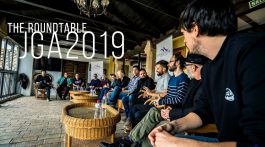
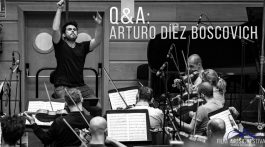
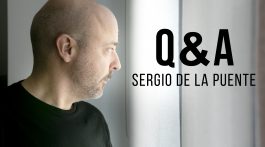
No hay comentarios